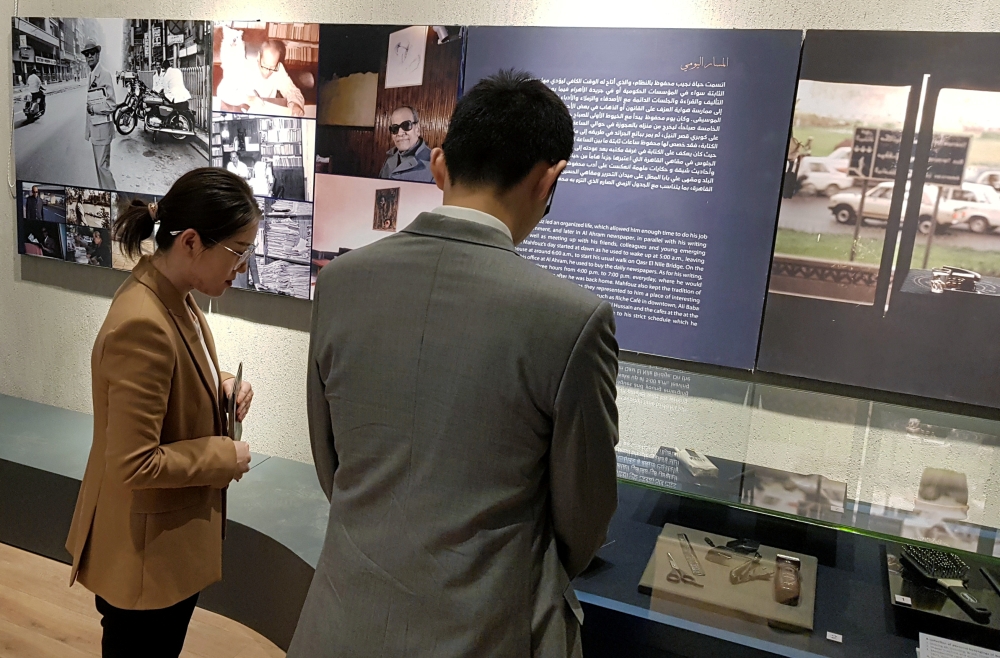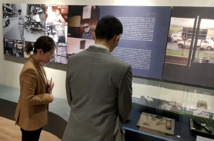That year, Egyptian authorities decided to set up a museum in his honour. But there were repeated delays, with media reports blaming governmental bureaucracy and the unrest that hit Egypt following the 2011 uprising.
On Sunday, Egyptian Culture Minister Inas Abdel-Dayem and Antiquity Minister Khaled al-Enani opened the museum, housed in a renovated 18th-century building in Islamic Cairo, where most of Mahfouz’s literary works are set.
The site in historic Cairo’s al-Azhar quarter has been chosen for the museum because it lies near the house where Mahfouz was born in December 1911, the Antiquity Ministry said in a statement.
The opening ceremony was attended by foreign diplomats and Mahfouz's daughter Om Kolthum.
Abdel-Dayem described the new museum as a milestone.
"The items on show tell the tale of the Nobel laureate, who succeeded in attracting the world's attention to modern Egyptian fiction," she said.
The museum displays published editions of Mahfouz’s books, their translations and some of his personal belongings offered by his family.
Also on show are awards he received during his long literary career and manuscripts of some of his works.
There is also a library of critical research on Mahfouz's literature, and a hall for screening films based on his works.
Mahfouz wrote 35 novels and dozens of collections of short stories, as well as plays. Most of his works have been made into popular films.
He was awarded the Nobel Prize in Literature in 1988 and is widely seen as the master of Arab fiction.
He was known for a style blending social realism and allegory that sometimes triggered controversy and accusations of blasphemy.
His novel "Gablawi's Children" was banned in Egypt after it angered Muslim fundamentalists for its alleged allegorical portrayal of God and prophets.
The novel was only published in Egypt in 2006, following Mahfouz's death.
In 1994, an Islamist militant attacked Mahfouz with a knife outside his Nile-side home in Cairo. The stabbing seriously impaired Mahfouz’s ability to write.
But Mahfouz remained active until shortly before his death, contributing a regular column to the state-run newspaper al-Ahram.
----------------------------------------------------------------------------------
On Sunday, Egyptian Culture Minister Inas Abdel-Dayem and Antiquity Minister Khaled al-Enani opened the museum, housed in a renovated 18th-century building in Islamic Cairo, where most of Mahfouz’s literary works are set.
The site in historic Cairo’s al-Azhar quarter has been chosen for the museum because it lies near the house where Mahfouz was born in December 1911, the Antiquity Ministry said in a statement.
The opening ceremony was attended by foreign diplomats and Mahfouz's daughter Om Kolthum.
Abdel-Dayem described the new museum as a milestone.
"The items on show tell the tale of the Nobel laureate, who succeeded in attracting the world's attention to modern Egyptian fiction," she said.
The museum displays published editions of Mahfouz’s books, their translations and some of his personal belongings offered by his family.
Also on show are awards he received during his long literary career and manuscripts of some of his works.
There is also a library of critical research on Mahfouz's literature, and a hall for screening films based on his works.
Mahfouz wrote 35 novels and dozens of collections of short stories, as well as plays. Most of his works have been made into popular films.
He was awarded the Nobel Prize in Literature in 1988 and is widely seen as the master of Arab fiction.
He was known for a style blending social realism and allegory that sometimes triggered controversy and accusations of blasphemy.
His novel "Gablawi's Children" was banned in Egypt after it angered Muslim fundamentalists for its alleged allegorical portrayal of God and prophets.
The novel was only published in Egypt in 2006, following Mahfouz's death.
In 1994, an Islamist militant attacked Mahfouz with a knife outside his Nile-side home in Cairo. The stabbing seriously impaired Mahfouz’s ability to write.
But Mahfouz remained active until shortly before his death, contributing a regular column to the state-run newspaper al-Ahram.
----------------------------------------------------------------------------------









 Home
Home Politics
Politics











